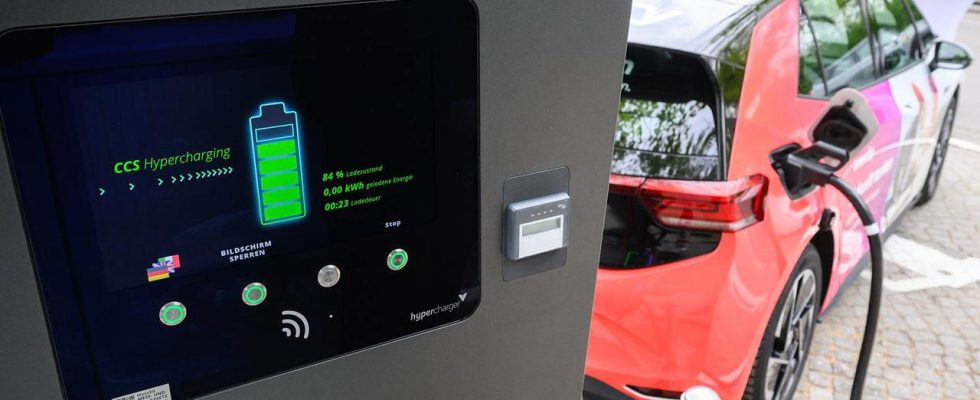faq
The state environmental bonus for electric cars ends earlier than planned. What consumers now have to pay attention to – and how manufacturers could react to the end of the purchase premium. The most important questions and answers.
Until when can applications still be submitted?
The federal government is accelerating the planned earlier end to the state purchase bonus for electric cars. As of December 17, 2023, no new applications for the environmental bonus can be submitted to the Federal Office of Economics and Export Control (BAFA), the Ministry of Economic Affairs and Climate Protection in Berlin announced. Funding that has already been promised is therefore not affected by the end of the funding and will be paid out.
Existing applications received up to and including December 17, 2023 will be processed in the order in which they are received and – provided the funding requirements are met – approved, the ministry explained. A spokesman told “Spiegel” that car buyers could only submit an application if they already had the car registered.
How high can the environmental bonus be?
Since January 1, 2023, only battery- and fuel cell-powered vehicles will be funded and no more hybrid vehicles. In addition, since September 1st, only private individuals can apply for the environmental bonus.
Most recently, the environmental bonus was 4,500 euros with a net list price of the basic car model of 40,000 euros and 3,000 euros with a net list price of over 40,000 euros to 65,000 euros.
Why is the government cutting the premium earlier?
In mid-November, the Federal Constitutional Court ruled that the federal government was not allowed to reallocate Corona loans. This created a billion dollar hole in the budget. The Climate and Transformation Fund (KTF) – which also finances funding for electric cars – was particularly affected. The traffic light coalition made up of the SPD, Greens and FDP agreed on Wednesday on how the billion-dollar holes will be plugged after the budget ruling. In their compromise on the 2024 federal budget, the parties agreed that the end of the environmental bonus would be brought forward. According to the current funding guidelines, the bonus should not have expired until next year.
How popular was the funding program?
In order to boost sales, the federal government at the time decided on a purchase bonus in 2016. The current government’s goal was actually to use the funding to get a total of 15 million fully electric cars onto the roads by 2030.
According to a statement from the Ministry of Economic Affairs and Climate Protection, a total of around ten billion euros have been paid out for around 2.1 million electric vehicles since 2016. The funding program was very successful and significantly advanced electromobility in Germany.
According to the Federal Office of Economics and Export Control, around 376,000 applications for electrically powered vehicles have been received so far this year and 2.4 billion euros have been paid out. The number of vehicles applied for fell in 2023 compared to 2022. In the previous year, 3.4 billion euros were approved for 820,000 vehicles.
To say something Consumer advocates to stop funding?
In principle, the Federal Association of Consumer Organizations welcomed an earlier expiry of state funding. “Purchase bonuses were important in the short term to stimulate the spread of electric cars,” said the federal association’s mobility expert, Marion Jungbluth, to the dpa news agency.
In the long term, however, the market ramp-up cannot be financed at the expense of taxpayers. But: “It must be ensured that at least everyone who has already ordered their electric vehicle with confidence in the funding receives a bonus.” To achieve this, the federal government must make the purchase date the decisive factor.
How do experts assess the future of electric cars?
Experts now fear that sales of electric cars could collapse. “In our opinion, the budget crisis is driving the car industry in Germany into an electric car crisis,” said industry expert Ferdinand Dudenhöffer. He expects a decline of up to 200,000 electric car sales in Germany in 2024. Without subsidies, electric cars would be significantly too expensive for new car buyers.
The ADAC is also convinced that the end of the funding is coming too soon. The automobile club complained that only three vehicles under 30,000 euros were available on the German market. It is to be hoped that there will now be increased competition so that prices will fall. “Manufacturers must also increase the range of cheaper vehicles,” said an ADAC spokeswoman.
Like the consumer advocates, the ADAC criticized the procedure of only making the funding commitment when a vehicle is registered, rather than when it is purchased. The decision is particularly bitter for consumers who have already ordered an electric vehicle but cannot register it before December 17th because they have taken the environmental bonus into account.

